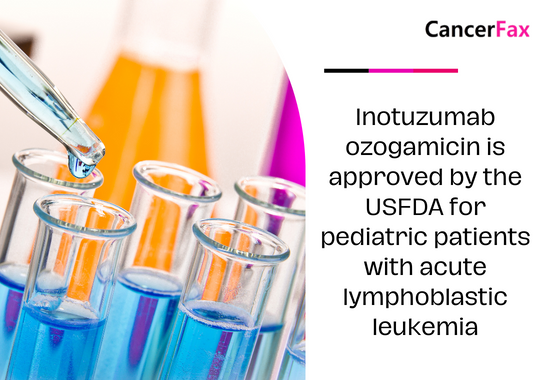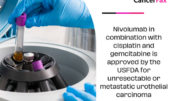Inotuzumab ozogamicin is approved by the USFDA for pediatric patients with acute lymphoblastic leukemia
6th March 2024: Inotuzumab ozogamicin (Besponsa, Pfizer) has been granted approval by the Food and Drug Administration for the treatment of relapsed or refractory CD22-positive B-cell precursor acute lymphoblastic leukemia (ALL) in pediatric patients aged 1 year and above.
The effectiveness of the treatment was assessed in a research conducted at multiple centers, involving 53 pediatric patients aged 1 year and older who had relapsed or refractory CD22-positive B-cell precursor acute lymphoblastic leukemia (ALL). The study assessed two different dose levels: an initial dose of 1.4 mg/m2/cycle in 12 individuals and a dose of 1.8 mg/m2/cycle in 41 participants. The premedications administered were methylprednisolone at a dosage of 1 mg per kilogram (with a maximum limit of 50 mg), an antipyretic, and an antihistamine. The patients underwent a median of 2 cycles of therapy, with a range of 1 to 4 cycles.
The primary endpoints of effectiveness were complete remission (CR), the length of time that CR lasted, and the percentage of patients who had a complete remission with no detectable minimal residual disease (MRD) present. Complete remission (CR) was characterized by the presence of less than 5% blasts in the bone marrow and the absence of leukemia blasts in the peripheral blood. Additionally, CR required the restoration of normal peripheral blood counts (platelets equal to or greater than 100 × 109 and absolute neutrophil count equal to or greater than 1 × 109/L), as well as the resolution of any extramedullary illness. Minimal residual disease (MRD) was characterized by the presence of leukemic cells accounting for less than 1 x 10-4 (less than 0.01%) of the total bone marrow nucleated cells, as determined by flow cytometry or PCR.
Among all patients, 22 out of 53 (42%, 95% CI: 28.1, 55.9%) achieved complete remission (CR), with a median period of 8.2 months (95% CI: 2.6, NE). The incidence of MRD negativity in patients with complete remission (CR) was 21 out of 22, which corresponds to 95.5% (95% confidence interval: 77.2, 99.9) according to flow cytometry. Based on RQ-PCR, the rate of MRD negativity was 19 out of 22, equivalent to 86.4% (95% confidence interval: 65.1, 97.1).
The predominant side effects (≥20%), encompassing test irregularities, were thrombocytopenia, pyrexia, anemia, vomiting, infection, bleeding, neutropenia, nausea, leukopenia, febrile neutropenia, elevated transaminases, stomach discomfort, and headache.
The first dose of inotuzumab ozogamicin for the first cycle is 1.8 mg/m2 per cycle. This dose should be given in three separate doses on Day 1 (0.8 mg/m2), Day 8 (0.5 mg/m2), and Day 15 (0.5 mg/m2). Cycle 1 has a period of 3 weeks, although it can be prolonged to 4 weeks if the patient achieves complete remission or complete remission with incomplete hematologic recovery, and/or to allow for recovery from toxicity. Refer to the prescribed directions for the recommended dosage following the initial cycle.
Dr. Nishant Mittal is a highly accomplished researcher with over 13 years of experience in the fields of cardiovascular biology and cancer research. His career is marked by significant contributions to stem cell biology, developmental biology, and innovative research techniques.
Research Highlights
Dr. Mittal's research has focused on several key areas:
1) Cardiovascular Development and Regeneration: He studied coronary vessel development and regeneration using zebrafish models1.
2) Cancer Biology: At Dartmouth College, he developed zebrafish models for studying tumor heterogeneity and clonal evolution in pancreatic cancer.
3) Developmental Biology: His doctoral work at Keio University involved identifying and characterizing medaka fish mutants with cardiovascular defects.
4) Stem Cell Research: He investigated the effects of folic acid on mouse embryonic stem cells and worked on cryopreservation techniques for hematopoietic stem cells.
Publications and Presentations
Dr. Mittal has authored several peer-reviewed publications in reputable journals such as Scientific Reports, Cardiovascular Research, and Disease Models & Mechanisms1. He has also presented his research at numerous international conferences, including the Stanford-Weill Cornell Cardiovascular Research Symposium and the Weinstein Cardiovascular Development Conference.
In summary, Dr. Nishant Mittal is a dedicated and accomplished researcher with a strong track record in cardiovascular and cancer biology, demonstrating expertise in various model systems and a commitment to advancing scientific knowledge through innovative research approaches.
- Comments Closed
- April 6th, 2024






Antibody-drug conjugate for kids, Besponsa for pediatric ALL, CD22-targeted therapy, Childhood cancer breakthroughs, FDA-approved ALL drugs 2024, Inotuzumab ozogamicin approval, Pediatric leukemia treatment, Relapsed pediatric ALL options
CancerFax is the most trusted online platform dedicated to connecting individuals facing advanced-stage cancer with groundbreaking cell therapies.
Send your medical reports and get a free analysis.
🌟 Join us in the fight against cancer! 🌟
Привет,
CancerFax — это самая надежная онлайн-платформа, призванная предоставить людям, столкнувшимся с раком на поздних стадиях, доступ к революционным клеточным методам лечения.
Отправьте свои медицинские заключения и получите бесплатный анализ.
🌟 Присоединяйтесь к нам в борьбе с раком! 🌟